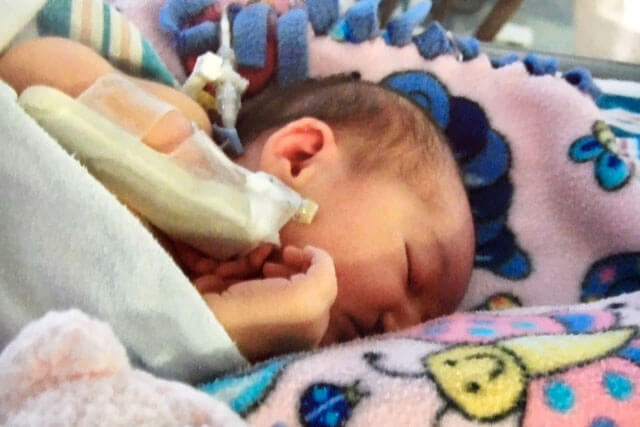“There is no such thing as a baby’ –meaning that if you set out to describe a baby you will find you are describing a baby and someone. A baby cannot exist alone but is essentially part of a relationship” (Winnicott, 1964, p 88).
The story begins on a late summer night in August after many long hours of labor. Did she cry right away? I think so, but I don’t quite remember. I am supposed to be happy, and why wasn’t she given to me right away after I delivered her? I heard her crying and my husband tells me that she was handed to him first. I have no memory of this. She was given to me for a moment and then taken to the nursery. I think she was still crying as they walked out with her. They came back a short time later to tell us that they had to take her up to the NICU. We were both scared with uncertainty at what this meant. The next thing I remember is waking up alone in the hospital room crying and pushing a call button for the nurse. My husband had gone home to try to get some rest after the two long days of labor. Where is my baby girl? How is she doing, and what just happened? The nurse came in and let me know that our daughter had aspirated and she was on oxygen. I called up to the NICU and talked to a nurse. She said my daughter was sleeping. The nurse gave me Ambien to help me sleep.
When I woke up, I saw a photo of my daughter at the bedside that the nurse had left for me. I began to weep. For our infant daughter, this was the narrative of her beginnings; her attachment relationship with her parents, being separated right after birth and taken to another floor in the hospital by strangers, being put in the neonatal intensive care unit, poked with a needle for an IV, and being put on oxygen.
If not for the support system I had around me, and my knowledge of working in the field that I do, I knew that this could all spiral downward quickly. Even knowing what I knew, there was no way to totally prepare myself for being a first time mother and to know that challenges that lie ahead of me. The world as I knew it was turned upside down. I knew that I needed to take care of myself so I could in turn take care of my infant daughter. I knew this after working as an Infant Mental Health Specialist for six years with other mothers who had just given birth. I knew that I was experiencing perinatal mood and anxiety issues due to the birth trauma and health issues for my newborn.
In sharing these early moments of our birth story, I hope that other mothers or fathers won’t feel so alone in their experiences. I hope that this can be a way to help normalize how common postpartum depression or anxiety can be whether there is birth trauma or not. I hope that our story can give courage to others that may be facing their own challenges to reach out for support. I share this in honor of Postpartum Depression Awareness month.
“Good infant mental health means a baby is nurtured and protected by caring adults – most often her parents – in a way that provides the basis for a secure parent-child attachment relationship. It is within these special relationships that babies build a strong (or weak) foundation for all emotional, cognitive, and social development. And, research has also made the link between these strong early relationships and a child’s lifelong physical health.” (mi-aimh.org).
Can a mother hear her baby cry? How do they hear the cry? What does the cry mean to the mom who is exhausted from getting no sleep and parenting her other children, or the mother or father who is experiencing baby blues, postpartum depression/anxiety, or even psychosis? If we can attune to the primary caretakers mental health and overall well-being, then babies have a chance to thrive and the mother’s will be able to hear the baby’s cry.
If you or someone you know may be dealing with perinatal mood or anxiety issues, there is support out there. At GR Therapy Group, we work to remove the stigma for anyone seeking therapy. We have staff specifically trained in perinatal mood and anxiety disorders, pregnancy, and infant mental health. Please don’t hesitate to reach out.

